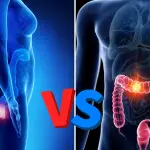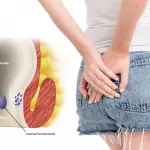Haemorrhoids, Just the word just puts you in awe, right?
If you suffer from it, you know well how annoying and potentially disabling a problem can be, capable of preventing the development of a normal life. But how long do external haemorrhoids last? Do they pass by themselves?
Let us learn more about haemorrhoids, symptoms and remedies.
How long do external haemorrhoids last?
Yes, I know you want us to get right to the point.
Before seeing hemorrhoid therapy and natural remedies, a little overview.
Hemorrhoids are incredibly common: about half of people suffer from hemorrhoids at least once in their life, before the age of 50.
They can affect men and women alike and are more frequent in elderly and pregnant people.
You see? This is a common and not a serious problem. You have absolutely nothing to be ashamed of!
Now, let’s look together how long external hemorrhoids last and how to cure hemorrhoids.
External haemorrhoids: what are they?
Let’s start with the basics. What are haemorrhoids exactly?
These are small cushions of venous vascular tissue, located along the circumference of the anal canal. In particular, at the level of the colorectal junction.
They are usually barely mentioned and play a positive role in maintaining anal continence systems.
But sometimes they can swell and become inflamed.
It is called hemorrhoidal disease and this is the real name of this pathology!
In the context of hemorrhoidal pathology, there are two types of hemorrhoids:
Internal hemorrhoids: they are inside the rectum and generally occur only with discomfort or pain during evacuation
External hemorrhoids: when they prolapse outside the anal opening
There may be cases of bleeding hemorrhoids during evacuation, which mainly concern external hemorrhoids.
THE MEANING: The term “hemorrhoid” derives from the Greek words haîma (blood), and rhéó (to flow). Since ancient times, hemorrhoids have been identified above all in their hemorrhagic nature.

How long do external hemorrhoids last?
This is a difficult question to answer precisely.
Let’s try to make some distinctions.
Small external hemorrhoids
Symptoms can subside in 4 to 5 days without any type of treatment. It will be enough to make improvements in diet and lifestyle to get rid of the problem.
Very swollen external hemorrhoids
Sometimes hemorrhoids can be so enlarged that they visibly protrude from the anus. In the most extreme cases we speak of hemorrhoidal prolapse.
In this case, deflation of external hemorrhoids can take a long time and it is often not enough to wait or use natural remedies.
In fact, a medical prescription hemorrhoid therapy may be necessary to solve the problem.
Pregnancy hemorrhoids
A good portion of pregnant women develop hemorrhoids during gestation.
It is a physiological mechanism, due to the increase in pressure in the abdomen caused by the weight of the fetus. This creates an obstacle to the outflow of blood from the haemorrhoidal veins, which will tend to swell.
External hemorrhoids usually come out in the third month of pregnancy.
In this case, the symptoms of hemorrhoids last until delivery.
External hemorrhoids: the symptoms
Speaking of hemorrhoid symptoms, the answer is always the same: IT DEPENDS.
If you have internal hemorrhoids, you may not have any symptoms.
Internal hemorrhoids are usually noticed because, after evacuation, hemorrhoidal bleeding occurs.
You may see blood in the cup or on the toilet paper after cleaning and it can be very frightening.
In reality it is yes a symptom that should never be taken lightly, but it is almost always attributable to harmless hemorrhoids.
External hemorrhoids, on the other hand, make themselves felt.
Symptoms of external hemorrhoids are:
- Itching
- Burning
- Intense pain
- Palpable swelling
- Sense of anal bulk
If you need to bring back external hemorrhoids, check out our article How do I bring back hemorrhoids?
How to get relief from external hemorrhoids
You know, we don’t like bragging about miracles.
In order to have definitive relief from the hemorrhoidal pathology it is necessary, even before embarking on a hemorrhoid therapy, to implement some lifestyle changes.
Let us remember that the main cause of hemorrhoids is the effort during the evacuation.
So to make them heal faster, we need to take action to reduce this strain!
Here are some tips to deflate external hemorrhoids and relieve symptoms:
- Modify your diet by including foods rich in fiber such as fruits, vegetables and grains. The fibers soften the stool and make it easier to pass.
- Drink plenty of water to help reduce constipation.
- Don’t hold back and go to the bathroom as soon as you feel the urge to defecate.
- Don’t spend too much time on the toilet.
- Put a stool under your feet during evacuation, to straighten the rectum and facilitate the passage of stool.
- Thoroughly cleanse the anal region. Toilet paper is not enough, always try to make a bidet after every evacuation. Alternatively, bring some wet wipes with you.
- Take regular sitz baths (lukewarm baths of the anal area only) or sit for about ten minutes in a tub with hot water.
- If you are pregnant, try to sleep on your side. In this way, the weight will not be placed on the rectum.
- Talk to your doctor who may prescribe a stool softener or a fiber supplement (psyllium, for example).
- If symptoms don’t go away, try over-the-counter medications. There are topical creams and gels containing cortisone or phenylephrine, such as the famous Preparation H. This type of hemorrhoid ointment is mainly used in case of inflamed and swollen hemorrhoids.
- Take this list as a priority ranking.
Over-the-counter drugs should be the last resort, only after trying other natural remedies and lifestyle adjustments.
If over-the-counter medications aren’t helping you, talk to your doctor to see if you need more advanced hemorrhoid treatment.
ATTENTION: Limit the use of cortisone creams over time. Continued use can thin the anal mucosa and predispose to injury.
External hemorrhoids: will they come back?
Unfortunately. If you’ve had hemorrhoids and are prone to them, they can come back.
Several studies have been conducted regarding the recurrence rate of hemorrhoids and most show results that are consistent with each other.
Specifically, a 2004 study compared two groups of people with hemorrhoids. The first group was treated pharmacologically, the second group underwent surgery.
What has been noted is that about 6% of the people undergoing surgery had a relapse, while as much as 25% of the members of the first group presented a new episode of haemorrhoidal disease.
External hemorrhoids: when to consult a doctor
Normally, external hemorrhoids are a pathology that can be managed independently at home, using natural or home remedies.
However, there are some cases where a doctor’s visit becomes necessary.
These cases are:
- Bleeding hemorrhoids
- I streaked red
- Black stools
- Intense pain
- Very pronounced prolapse
- It is not uncommon to find patients embarrassed to talk to a doctor about their hemorrhoids.
But you won’t be among them, will you?
Remember that the doctor is there to help you, that he sees cases like yours practically every day and that hemorrhoids are so common that there is really nothing to worry about.
How long haemorrhoids last: How can the doctor help?
Your doctor can advise you on the type of treatment that is best for you and prescribe medications and ointments that cannot be purchased over the counter.
He can also direct you to surgical treatment, if he believes it is the only way to cure hemorrhoids permanently!
Let’s see the main treatment options for hemorrhoids:
Specific creams
In cases of more severe hemorrhoids, an over-the-counter hemorrhoid cream is not enough to solve the problem. Your doctor will be able to prescribe a more powerful and specific cream, such as an anti-inflammatory for hemorrhoids.
Minimally invasive surgery
These are surgical procedures that the specialist also performs on an outpatient basis and often help eradicate hemorrhoids.
The advantage consists in the reduction of postoperative pain and in very short healing times.
Furthermore, it does not require anesthesia.
Some examples are elastic hemorrhoid ligation, sclerotherapy, and laser or infrared coagulation.
Thrombectomy
It concerns the cases of thrombosed hemorrhoids that cause intense pain.
This is an operation to remove hemorrhoids from the outside, to eliminate the cause of the pain.
Surgery
Major surgery offers many innovative techniques, which can help you solve the problem at its root.
If the above remedies have not worked, your doctor will be able to guide you to the right surgery for you.
Hemorrhoids with fever? Be careful not to confuse hemorrhoids with anything else. For example, if you have hemorrhoids and a fever, it is not hemorrhoids, but an anal abscess, an acute and infectious disease.






